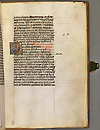An online exhibition produced by the National Library of Medicine, Bethesda, MD, USA
Visiting Curator: Alain Touwaide, Ph.D., Smithsonian Institution, Washington, DC, USA

Manuscript E 78, f. 35 recto.
Medicine in the Old World arose from many components: the classical Greek tradition, its Christian re-elaboration, the contributions of the Arabic World, and the unique medieval synthesis of them all. By examining significant pages and illuminations from manuscripts and early printed books of the National Library of Medicine, one can see how these cultures contributed to the creation of medical knowledge in Europe.
These pages are a journey through time and space, as medical knowledge moved around and across the Mediterranean Sea. Mare nostrum—Our Sea—divided societies into several groups, but it could be crossed, making cultural contact, trade, and the exchange of ideas possible.
This odyssey of knowledge examines how medical science took root in Southern Europe, was absorbed and modified by local medical practice and knowledge, and spread into the hinterland and beyond. It shows how European medicine is the result of the confluence of different streams of thoughts—from classical antiquity to pre-modern science, from Greece to Western Europe, and from discoveries based on reason to those rooted in tradition and experience.
Last Reviewed: May 2, 2012


